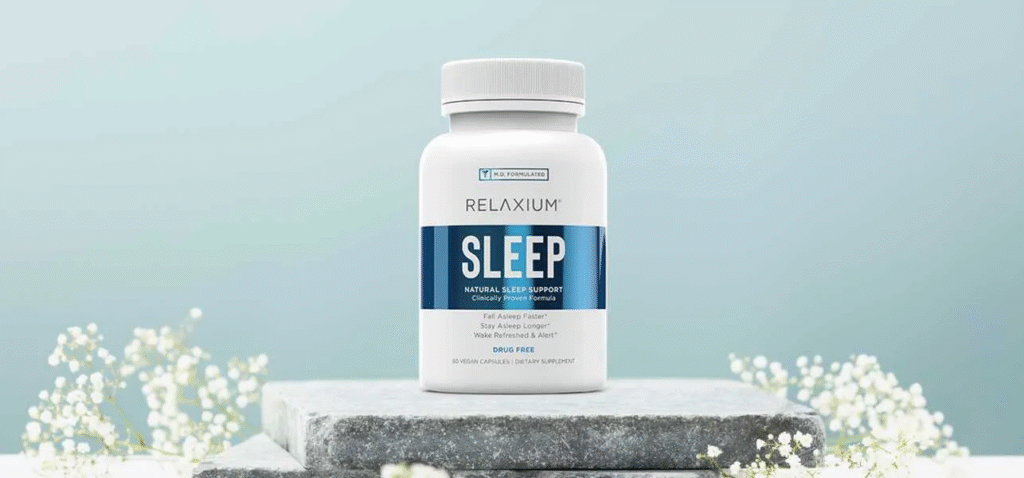If you’re one of the millions struggling with occasional sleepless nights, you’ve probably come across Relaxium — a popular dietary supplement claiming to support better sleep and relaxation. But does it really work? Is it safe? And how does it compare to other natural sleep aids?
In this in-depth guide, we’ll explore everything you need to know about Relaxium, including its ingredients, potential benefits, side effects, and customer experiences.
What Is Relaxium?
Relaxium is a dietary supplement designed to promote relaxation and support restful sleep. Marketed as a natural sleep aid, it’s often advertised on TV, online, and in health stores. The product was developed by Dr. Eric Ciliberti, a neurologist, and is part of a growing market for non-prescription sleep support products.
Relaxium’s formula is designed to:
- Help you fall asleep faster.
- Support staying asleep longer.
- Promote calmness without morning grogginess.
But what’s actually inside this supplement? Let’s take a closer look.
Relaxium Ingredients: What’s in the Formula?
Relaxium contains a blend of vitamins, minerals, and herbal extracts. Here’s a breakdown of the key ingredients:
1. Melatonin (5 mg)
Melatonin is a hormone naturally produced in the pineal gland that helps regulate sleep-wake cycles. Supplemental melatonin is commonly used to combat jet lag, shift work sleep issues, and general insomnia.
Pros:
- May help reset your internal clock.
- Shown in studies to shorten time to fall asleep.
Cons:
- Can cause vivid dreams in some people.
- Not ideal for long-term daily use.
2. Magnesium (100 mg)
Magnesium plays a role in muscle relaxation and nervous system regulation. A deficiency in magnesium has been linked to poor sleep quality.
Pros:
- May reduce restless leg symptoms.
- Supports overall relaxation.
3. L-Tryptophan (500 mg)
An amino acid precursor to serotonin and melatonin, L-Tryptophan is often used in supplements aimed at mood and sleep.
Pros:
- Can support a calm mood.
- May help with sleep onset.
Cons:
- Effectiveness varies from person to person.
4. Valerian Root Extract (228 mg)
Valerian root has been traditionally used for centuries as a herbal remedy for insomnia and anxiety.
Pros:
- Shown in some studies to improve sleep quality.
- Non-habit forming.
Cons:
- May cause mild stomach upset in some users.
5. Ashwagandha (125 mg)
This adaptogenic herb is gaining popularity for its potential stress-reducing properties.
Pros:
- May help lower cortisol levels.
- Can promote a sense of calm.
Cons:
- Not all studies agree on effectiveness.
6. Chamomile, Hops, and Passionflower
These botanical extracts are commonly used for their mild sedative effects.

Potential Benefits of Relaxium
Relaxium claims to deliver several benefits for those struggling with sleep:
- 💤 Faster sleep onset
- 🌙 Improved sleep duration
- 🌿 Natural, non-habit forming formula
- 🌞 Wake up feeling refreshed
However, it’s important to note that results may vary. While some users report improved sleep, others notice little to no effect.
Are There Any Side Effects?
Although Relaxium is marketed as “safe and natural,” it’s not entirely free of potential side effects. Possible issues include:
- Drowsiness the next day (especially from melatonin).
- Vivid dreams or nightmares.
- Gastrointestinal discomfort (nausea, cramps).
- Allergic reactions (rare).
Caution: Consult your healthcare provider before using Relaxium, particularly if you:
- Are pregnant or breastfeeding.
- Take medications for sleep, anxiety, or depression.
- Have a history of medical conditions like liver or kidney disease.
What Do Customers Say?
Reviews of Relaxium are mixed. On third-party sites like Amazon and Trustpilot, the supplement has both enthusiastic fans and disappointed users.
Positive Reviews Highlight:
✅ Falling asleep faster.
✅ Feeling more relaxed at bedtime.
✅ No grogginess the next morning.
Negative Reviews Cite:
❌ No noticeable effect.
❌ Auto-ship billing issues with the company.
❌ Mild side effects (stomach upset, drowsiness).
How Does Relaxium Compare to Other Sleep Aids?
Relaxium is one of many natural sleep aids on the market. Compared to others:
| Feature | Relaxium | Other Natural Aids |
|---|---|---|
| Melatonin dose | 5 mg | 1–10 mg (varies) |
| Herbal extracts | Yes (Valerian, Ashwagandha, etc.) | Varies widely |
| Non-habit forming | Yes | Yes |
| Price | Higher than average | Often lower |
If you’re considering alternatives, look for products with transparent ingredient lists and solid customer reviews.
Should You Try Relaxium?
Relaxium may be worth trying if:
- You prefer a natural supplement over prescription sleep aids.
- You experience occasional sleeplessness, not chronic insomnia.
- You’ve consulted a healthcare provider about its suitability.
However, it may not be ideal if you:
- Expect guaranteed results.
- Have sensitivities to melatonin or herbal supplements.
- Are on a tight budget, as it’s pricier than many competitors.
Tips for Better Sleep Without Supplements
Even if you decide to try Relaxium, lifestyle changes are the foundation of good sleep:
🌱 Stick to a regular sleep schedule
📱 Limit screen time before bed
🏋️♂️ Exercise regularly (but not too close to bedtime)
☕ Avoid caffeine in the late afternoon
🛏️ Create a cool, dark, quiet sleep environment
These habits can support restful sleep with or without supplements.
Final Thoughts
Relaxium is a well-known supplement with a thoughtful blend of ingredients aimed at promoting sleep and relaxation. While some users swear by it, others find little benefit. As with any supplement, effectiveness varies, and it’s best used as part of a broader strategy for healthy sleep.
Before starting Relaxium or any sleep aid, consult your doctor, especially if you take other medications or have health concerns.


